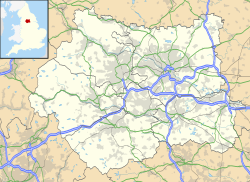History
The building was designed by Richard Coad as the headquarters of the 4th West Yorkshire Rifle Volunteer Corps and was built between 1868 and 1870. [1] This unit evolved to become the 1st Volunteer Battalion, The Duke of Wellington's Regiment in 1883 and the 4th Battalion, The Duke of Wellington's Regiment in 1908. [2] The battalion was mobilised at the drill hall in August 1914 before being deployed to the Western Front. [3]
The 4th Battalion, The Duke of Wellington's Regiment converted to become the 58th (4th Bn Duke of Wellington's Regiment) Anti-Tank Regiment, Royal Artillery in 1938 and, after service in the Second World War, evolved to become the 382nd (Duke of Wellington's) Regiment, Royal Artillery in 1947; it converted back to form the West Riding Battalion, The Duke of Wellington's Regiment (West Riding) in 1961. [2]
However, the presence at the Prescott Street drill hall was reduced to one company, A Company, the West Riding Battalion, The Duke of Wellington's Regiment (West Riding) at that time. [4] This unit evolved to become C Company (The Duke of Wellington's), Yorkshire Volunteers in 1967 and B (The Duke of Wellington's Regiment) Company, 3rd Battalion, The Duke of Wellington's Regiment (West Riding) (Yorkshire Volunteers) in 1993. [4] After the company disbanded in 1999, the drill hall was decommissioned and converted for residential use. [5]
This page is based on this
Wikipedia article Text is available under the
CC BY-SA 4.0 license; additional terms may apply.
Images, videos and audio are available under their respective licenses.

